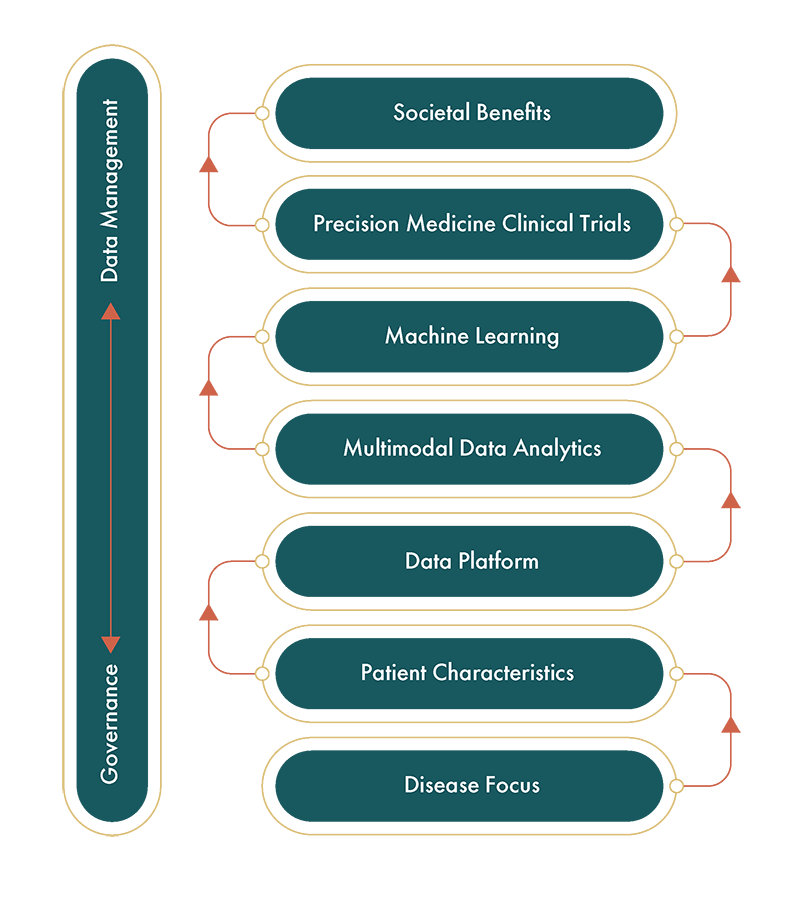The Programme

Precision ALS is a €10 million research programme involving researchers at the SFI Research Centres ADAPT and FutureNeuro along with the TRICALS Consortium, Europe’s largest ALS research initiative. National and International industry partners and charities including patient organisations are also actively participating.
Precision ALS will provide an innovative and interactive platform for all clinical research in ALS across Europe, that will then harness artificial intelligence (AI) to analyse large amounts of data. The programme cements Ireland’s world leadership position in the application of Artificial Intelligence and Machine Learning to ALS research and will generate scores of new jobs in clinical and data science research, new technologies and drug development.
This is a unique programme that brings together Clinicians, Computer Scientists, Information Engineers, Technologists, and Data Scientists. The researchers will work together with a number of industry partners to generate a sustainable precision medicine-based approach towards new drug development that will have many benefits including better clinical outcomes for patients and reducing the economic cost of these diseases.
Our Vision

Research to find an effective treatment for ALS to date has yielded little success. A radical change in perspective is needed in late translational and early clinical research. Precision ALS aims to shift the main focus of research from laboratory-based work and animal models to applied clinical research in collaboration with those people affected by the disease.

The programme will involve collecting and analysing a wide range of data types. This will require a large-scale international collaboration between clinicians, clinical scientists, data and computer scientists, and more. Collaboration of this scale is unprecedented in ALS research and will demand innovative strategies to gain insight into the disease. Artificial intelligence and machine learning techniques will be necessary to capitalise on this rich dataset and discover new insights that cannot be discerned by clinical evaluation alone.
As ALS is a rare disease, sufficient scale is needed to provide the statistical power for meaningful discoveries. To achieve this, this research programme will require the collaboration of the TRICALS research consortium. Data will be collected at nine TRICALS sites across Europe. This collaboration will provide the necessary volume and diversity of data to allow for the discovery of key insights that may otherwise be overlooked. Experts at each site will also assist in the analysis of data and interrogation of results to ensure the leading ALS researchers in Europe work collaboratively, not competitively, to learn more about neurodegenerative disease and the factors that contribute to it.
On completion, Precision ALS will be a first-in-kind pan-European ICT framework for ALS that can be easily adapted to other diseases that face similar precision medicine-related challenges.
About ALS
Amyotrophic Lateral Sclerosis (ALS), also known as Motor Neurone Disease (MND), is a progressive neurological condition that causes the degeneration of neurons in the brain and spinal cord. This can lead to a decline in movement, cognition, and behaviour. Simple tasks such as eating, speaking, and breathing can become difficult for those affected by the disease. Although uniformly fatal, life expectancy can vary from three months to many years from first symptom. Currently, there are no effective treatments to stop the progression of ALS.
The exact cause of ALS is unknown. However, a number of genetic mutations linked to the disease have been discovered in recent years, although the majority of ALS patients are not known to carry any of these mutations. ALS is likely caused by variable combinations of these genes interacting with lifestyle, environment, and other genes.
ALS is a highly heterogeneous disease; symptoms, prognosis, and disease mechanism can vary widely from one patient to another. A standardised, one-size-fits-all approach, therefore, could not address the differing needs of each individual. It is apparent that future treatments for ALS will require a precision medicine-based approach. This will involve using data analysis to categorise patients into more specific subgroups based on biological characteristics, which will, in turn, allow for more targeted and effective clinical trials.
Objectives
This programme will address the fundamental gaps in clinical and computational and data science research that have contributed to the failure of translational medicine in ALS. This type of ambitious innovative and iterative collaboration between Clinicians, Computer Scientists, Information Engineers, Technologists and Data Scientists has never before been undertaken.
We will address the following questions:
- How to make data continuously accessible for interrogation in a single repository
- How best to analyse data across different modalities collected from multiple sites
- Which biomarkers, both existing and novel, are most useful in diagnostics and prognostics?
- How best to develop, integrate and validate digital technologies to inform future outcome measures
- What is the best way to deliver a patient-centric approach towards measurement of disease?
- Is there a whole-illness model, based on patient and caregiver journey data, that can define “benefit” from a health economic perspective?
- How can this patient data platform design inform both clinical science and e-health strategy to transform care for Irish patients?



